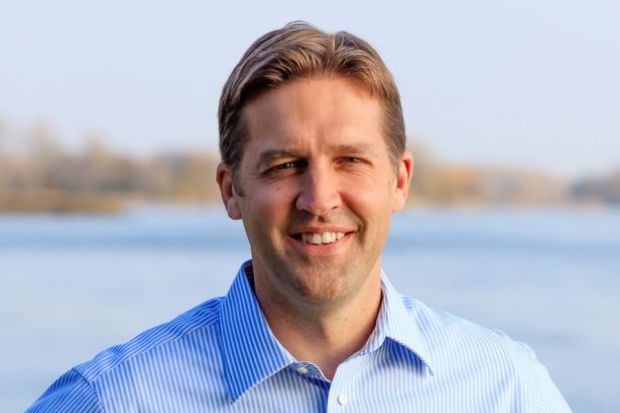The University of Florida’s bid to install Republican Senator Ben Sasse as its next president is growing confrontational, with the administration threatening disciplinary action against students protesting the selection.
After loud interruptions during an introductory meeting with Dr Sasse, Florida’s outgoing president, Kent Fuchs, promised to resume enforcement of a decades-old university prohibition against protests inside campus buildings.
Professor Fuchs, in announcing the decision, made particular note of the scheduled 1 November vote on the Gainesville campus, where the university’s board of trustees is due to vote on Dr Sasse’s candidacy.
“We have not enforced this policy in recent years,” Professor Fuchs said in a note to the university community, “because in the rare cases that protesters entered buildings, they were respectful of others and their rights to speak and to hear.”
Professor Fuchs announced earlier this year his plans to step down after seven years on the job, amid numerous instances of political interference in academic activities by the state’s Republican governor, Ron DeSantis, a likely 2024 US presidential candidate.
University leaders announced earlier this month their search committee’s identification of Dr Sasse, a rare Republican critic of Donald Trump who also has past experience leading a university, as their sole choice to replace Professor Fuchs.
The selection quickly garnered opposition at the 60,000-student flagship institution in the nation’s third-largest state, over both the secretiveness of the search process and Dr Sasse’s political record, especially his opposition to LGBTQ rights. The student government has formally expressed its lack of support for the choice of Dr Sasse and the main faculty union was expected this week to do the same.
But the matter moved beyond rhetoric at a student forum this month with Dr Sasse, Professor Fuchs said, when “a large group of protesters entered the building, chanting loudly, banging their fists on windows, walls and furniture and making it difficult for audience members to hear Dr Sasse’s responses”.
After the forum ended and Dr Sasse left the room for a break, some protesters entered and prevented a planned subsequent meeting between Dr Sasse and university staff, Professor Fuchs said.
Students who violate the ban on protests inside campus buildings during the trustees’ meeting “may be subject to discipline under the Student Conduct Code”, the president said, without detailing specific repercussions.
While currently a US senator representing the rural and conservative state of Nebraska, Dr Sasse has an extensive academic track record that includes degrees from Yale and Harvard universities, and service as a faculty member at Yale and the University of Texas, and as president at Midland University.
In a question-and-answer session with faculty, Dr Sasse gave what some attendees described as unsatisfactory answers on his political positions. Asked about his previous criticism of the US Supreme Court’s 2015 decision legalising same-sex marriage, he said he now regards the matter as “settled law”. On climate change, the senator said humans play a role but called himself sceptical about the state’s ability to make a difference.
The president of the local faculty union at the university, Paul Ortiz, a professor of history, complained that students, staff and faculty were rebuffed in their efforts to discuss issues with Dr Sasse, and said that university officials improperly described the student protests as “some kind of carnival-atmosphere protest. Such was not the case. The students on our campus are very reasonable.”
“A dialogue runs in two directions,” Professor Ortiz said. “Senator Sasse will have to make a stronger commitment to address the kinds of tough questions he will have to deal with as president of a research university.”
Register to continue
Why register?
- Registration is free and only takes a moment
- Once registered, you can read 3 articles a month
- Sign up for our newsletter
Subscribe
Or subscribe for unlimited access to:
- Unlimited access to news, views, insights & reviews
- Digital editions
- Digital access to THE’s university and college rankings analysis
Already registered or a current subscriber? Login








